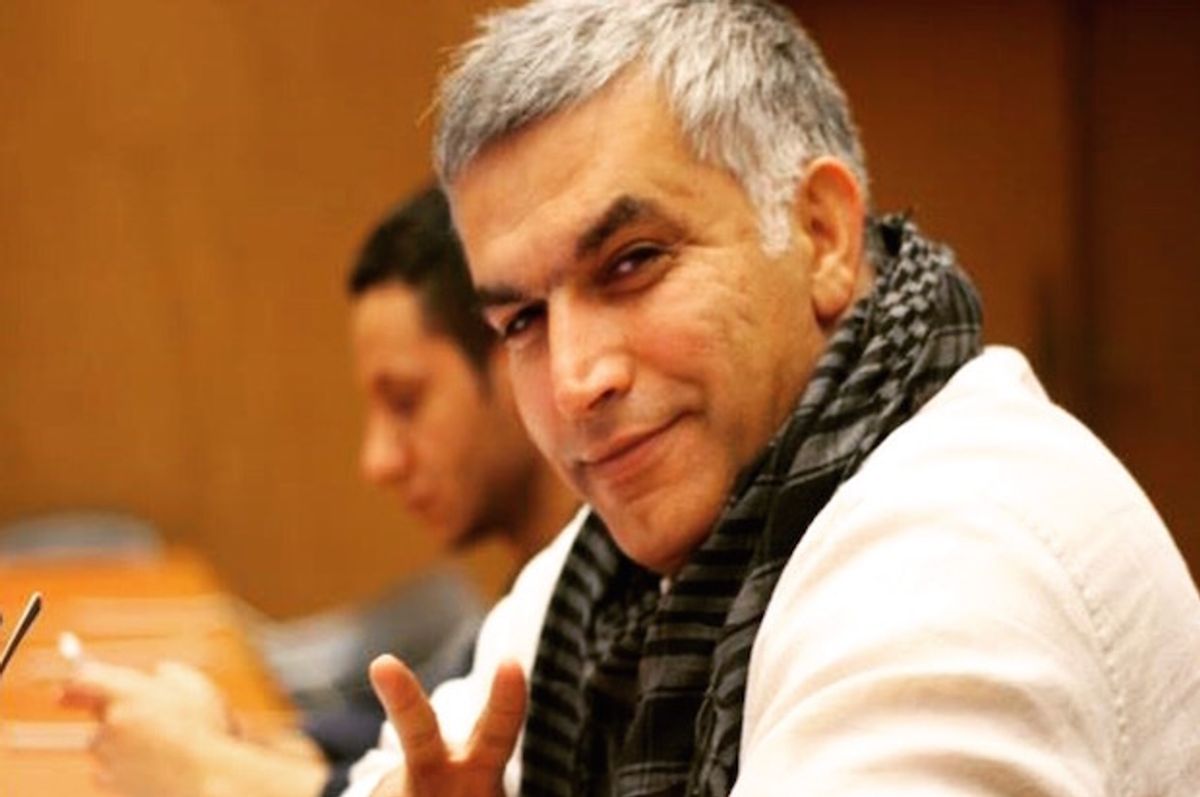A prominent human rights activist in a U.S.-allied country faces up to 15 years in prison because of his tweets.
Dozens of non-governmental organizations sent a letter to Bahraini King Hamad al-Khalifa on Friday, calling for the release of activist Nabeel Rajab.
Since the 2011 pro-democracy uprising in the Gulf monarchy Bahrain, which was violently crushed by 2,000 Saudi and Emirati troops, Rajab has been arrested numerous times for his human rights work and peaceful activism.
On June 13, 2016, Rajab was again arrested, in what rights groups describe in the new letter as an attack on "his peaceful exercise of the right to freedom of expression."
The letter was signed by 33 non-governmental organizations, including Reporters Without Borders, Index on Censorship, the International Federation for Human Rights and more.
"The decision to re-arrest Nabeel for tweets says everything you need to know about the Bahraini government’s will to reform: it doesn’t exist," Husain Abdulla told Salon.
Abdulla is executive director of the U.S.-based advocacy group Americans for Democracy and Human Rights in Bahrain, which helped organize the letter campaign and is one of the signatories.
"Nabeel’s detention comes in the middle of one of the worst crackdowns on activism and peaceful protest this country has seen since the authorities violently suppressed the 2011 pro-democracy uprising," he said.
"We’re nearing unprecedented levels of repression in Bahrain," Abdulla added.
Bahrain is a close U.S. ally. It is the home to the Navy's Fifth Fleet and has a free trade agreement with the U.S. The State Department refers to the repressive Gulf monarchy as "a vital U.S. partner in defense initiatives."
In his most recent arrest, Rajab was hit with a slew of charges. He faces up to 10 years in prison for spreading “false or malicious news, statements or rumors” on Twitter. Rajab has a popular Twitter account, with more than 325,000 followers, where he frequently shared information about rights abuses in the Gulf and the broader Middle East.
He could potentially be imprisoned for another two years for “offending a foreign country” — Saudi Arabia — for tweeting about the atrocities committed by the U.S.-backed, Saudi-led coalition in Yemen.
Rajab faces an additional three years if convicted of “offending a statutory body,” for tweets and retweets about allegations of torture in Bahrain's Jau prison. Human Rights Watch has reported on allegations of severe prisoner abuse at this facility. In its 2016 report, the rights group also documented Bahraini authorities' use of torture.
Moreover, Rajab could face a trial on further charges of “spreading false news,” because of similar statements he made in TV interviews in 2015.
The letter noted that Rajab is in poor health and has not received the medical care he needs. It also said he has been detained in unsanitary conditions.
"Rajab's arrest is one in a series of repressive actions to severely restrict the work of human rights defenders and civil society members in the kingdom of Bahrain," the NGOs wrote in the letter.
Human Rights Watch describes Bahrain's human rights record as "highly problematic," noting the monarchy's "courts convict and imprison peaceful dissenters and have failed to hold officials accountable for torture and other serious rights violations."
In August, Amnesty International called for Rajab to be freed, describing him as a prisoner of conscience.
Rajab is a one of the most prominent rights activists in his country. He serves as the president the Bahrain Center for Human Rights, the founding director of the Gulf Center for Human Rights and a member of the advisory committee for Human Rights Watch's Middle East and North Africa division.
He is not alone, nevertheless. Thousands more political prisoners join Rajab in Bahrain's prisons.
"Nabeel is just one of approximately 4,000 political prisoners currently held in the country, making Bahrain one of the highest per capita jailers in the Middle East," Abdulla explained in an interview with Salon.
"Every week the security forces interrogate or arrest dozens of additional people on allegations related solely to the enjoyment of basic human freedoms, such as those to belief, political expression, and peaceful assembly," he said.
Abdulla added, "The sheer scale and frequency of arbitrary detention has had a deeply chilling effect on independent civil society and political activism in Bahrain."
The letter was also sent to U.S. Secretary of State John Kerry, U.K. Foreign Secretary Boris Johnson, U.N. High Commissioner for Human Rights Zeid Ra'ad al-Hussein and Federica Mogherini, high representative of the European Union for foreign affairs and security policy.
After Rajab was arrested in June, U.N. Secretary-General Ban Ki-moon released a statement criticizing the Bahraini monarchy for clamping down on the political opposition.
The U.S. State Department has also publicly called on Bahrain to release Rajab, and said it "raised concerns with the government of Bahrain, particularly on this case."
Abdulla is concerned that the U.S. has not done enough, however. "While we certainly appreciate the fact that the U.S. has made direct, unequivocal calls for Nabeel’s release, there is much more it can do to encourage human rights reform in Bahrain," he said.
He stressed: "The U.S. must be willing to leverage its extensive security relationship with the Bahraini government — from multi-million-dollar arms deals to the Fifth Fleet’s naval base — in order to press for the freedom of other human rights defenders and the cessation of atrocious police practices, including systematic torture and enforced disappearance."



Shares